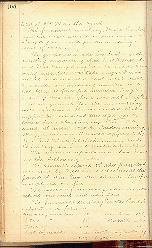 Previous
Previous
EXHIBIT: Cultural Conflict and Acculturation

 Previous Previous
|
EXHIBIT: Cultural Conflict and Acculturation |
Next
|
 Turners Women's Auxiliary minutes (change from German to English in minutes). |
Ostensibly the World War hastened assimilation of the German element. However, this "assimilation" was not a voluntary one. It is, therefore, very doubtful that it really changed the minds of the older generation. . . . The most noticeable result of the war was the barring of the German language, for all practical purposes, from the younger generation . . . [for] an almost universal assault [had begun] on the teaching of German in the schools. . . . The German-language press—except for the Fort Wayne Staatszeitung und Freie Presse—did not survive. Neither did a number of organizations, notably the influential German-American Alliance. The German churches, however, and the Turnvereins, though under different labels, the Maennerchor and the Liederkranz still remained active. . . . [After the war] the Academy of Music again became the Maennerchor, and the Musikverein was singing German folk songs. . . . The German's love of song continued to be a part of his soul. He persisted in his fight against prohibition even when he could no longer drink his beer, and he remained an exponent of a freer use of the Sabbath Day. German thrift and honesty were passed on as part of a family tradition.
Finally, World War I was not the means through which the German-Americans became patriotic citizens, for their loyalty to the United States throughout its history cannot be questioned. . . . It is far more accurate to say that the First World War speeded up the process of the sole use of the English language among citizens of German ancestry than to state that the war had something to do with making them loyal citizens.
The World War had come as a shock to the Americans of German descent. It caused tragic misunderstandings between them and other elements of the community, and it seriously curbed German-American activities. In spite of their unfavorable attitude toward the entry of the United States into the war, the Germans of Indianapolis loyally supported the government. The conclusion of the war brought about a period of readjustment in which the German language was barred from the schools and German cultural activities were frowned upon, but it did not suddenly disconnect the German-Americans from their religious, cultural, and social traditions. The aftermath of the World War found German culture adjusting itself to an American environment.

|
HOME | EXHIBIT | EXPLORE | EXAMINE | ABOUT | OTHER | SEARCH |

|
|
Updated: 29 April 2004, RKB Comments: speccoll@iupui.edu URL: http://www.ulib.iupui.edu/special/digproj/circle/exhibit5_7.html Copyright © 1998-2004 - The Trustees of Indiana University |
Ruth Lilly Special Collections and Archives IUPUI University Library 755 W. Michigan St. Indianapolis, IN 46202 (317) 274-0464 |